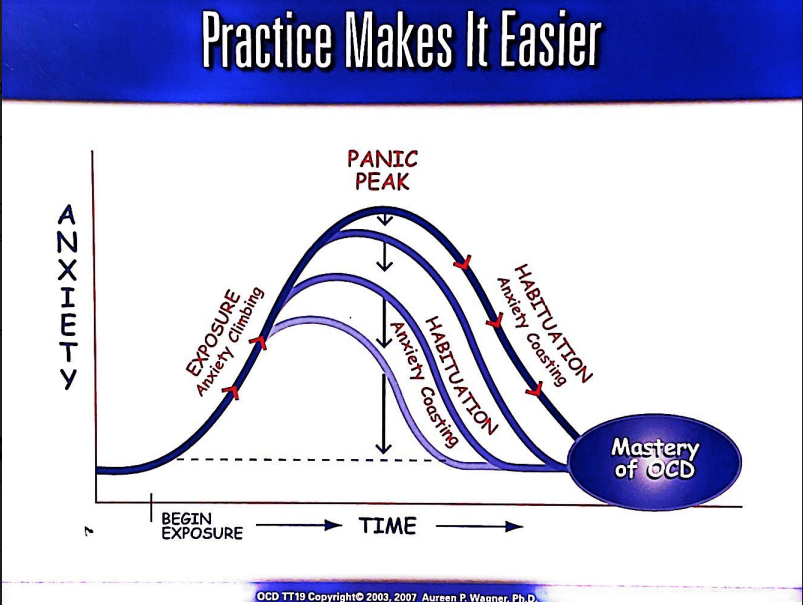
What is ERP?
Exposure Response Prevention (ERP)
Do you struggle to face your fears?
Do you worry that you will never move past time-consuming compulsions?
Have you tried traditional therapy and noticed that your OCD symptoms haven’t improved?
Exposure Response Prevention (ERP) is the evidence-based best-practice treatment for OCD.
In this technique, the therapist guides the client towards their fears by purposefully exposing them to the thoughts, images, and situations that trigger the obsessions. The therapist then supports the client in resisting the compulsive behaviors that would usually be utilized to neutralize the anxiety. Compulsive behaviors include mental rituals such as reassurance seeking, checking, and counting.
ERP follows a regimented routine that slowly acclimates the client to more and more challenging fears. Rather than comfort the client, therapists are trained to allow the client space to experience the ebbs and flows of their distress.
Once a client learns to sit in the uncertainty of distress and accept that respite will come naturally, rather than artificially through a compulsion, they gain confidence in the face of their fears.
As the client continues to resist compulsions despite increasingly triggered obsessions, their nervous system actually becomes acclimated to the shift in behavior. Exposures are repeated for as long as needed until the client reports almost feeling bored with something that previously terrified them.
With ERP, our brains and bodies actually learn a new response to triggers. We experience a natural drop in anxiety level called habituation.
ERP exercises can and must be quite creative, because triggers and compulsions run the gamut of human experience.
At Kairos Wellness Collective, our clinicians are trained to conduct ERP both in the office and out in the world. Our clients are paired with dynamic, flexible clinicians, who feel comfortable in a variety of new situations. Our clinicians are non-judgmental of fears and compulsions; most have experienced a personal journey with OCD treatment.
While there is no “cure” for OCD, clients who wholeheartedly commit to treatment through ERP often find that their targeted symptoms go into remission in as few as 12 sessions.
What are some of the roadblocks to successful ERP treatment for OCD or Phobias?
While Exposure and Response Prevention (ERP) is an effective treatment approach for anxiety disorders such as obsessive-compulsive disorder (OCD), phobias, and skin picking disorder, there can be roadblocks or challenges that individuals may face during the therapy process.
Here are some common roadblocks to ERP:
Initial Discomfort and Anxiety during ERP: Engaging in exposure exercises can initially provoke significant discomfort and anxiety. It can be challenging for individuals to tolerate these intense emotions and resist the urge to engage in their usual rituals or avoidance behaviors. The initial surge of anxiety can be discouraging and may lead some individuals to discontinue or avoid ERP.
Fear of Losing Control during Exposures: Individuals with anxiety disorders often have a fear of losing control or experiencing a catastrophic outcome. Engaging in ERP exercises that intentionally confront feared situations or triggers can evoke this fear. It may require reassurance, support, and psychoeducation to help individuals understand that their fears are unlikely to come true and that they can safely engage in exposure exercises.
Unrealistic Expectations for ERP effectiveness: Some individuals may have unrealistic expectations about ERP, hoping for immediate relief or a complete elimination of anxiety symptoms after a few sessions. ERP is a gradual process, and progress varies for each individual. It's important to manage expectations and help individuals understand that progress may take time.
Reluctance to Face Fears or Phobias: The prospect of intentionally exposing oneself to feared situations or triggers can be intimidating and uncomfortable. Some individuals may feel resistant or reluctant to engage in exposure exercises due to the fear of experiencing distress or uncertainty. Building motivation and addressing ambivalence can be crucial in overcoming this roadblock.
Avoidance Behaviors around Anxiety: Avoidance behaviors are a common coping strategy for individuals with anxiety disorders. They provide temporary relief from anxiety but reinforce the underlying fears and maintain the anxiety over the long term. Encouraging individuals to resist engaging in avoidance behaviors during ERP can be challenging, as the urge to avoid can be strong.
Lack of Support for ERP: Having a supportive environment and a therapist who understands and guides the ERP process is important for success. Lack of support or inadequate understanding of ERP from family, friends, or even the therapist can be a roadblock. It's essential to have a therapist who is knowledgeable about ERP techniques and can provide guidance and encouragement throughout the therapy process.
High Levels of Distress: Some individuals may experience high levels of distress during exposure exercises, which can be overwhelming and make it difficult to continue with the therapy. In such cases, it may be necessary to start with less intense exposures or to provide additional support and coping strategies to manage distress effectively.
Addressing these roadblocks often requires a collaborative approach between the individual and the therapist. At Kairos Wellness Collective, we pride ourselves in accompanying treatment with open communication, psychoeducation, gradual exposure, and the development of coping skills (such as mindfulness). All these approaches are important components of achieving successful outcomes in ERP.
Relevant Blog Posts
Contact Us Today
Do you have questions about ERP? Contact Us Today:





